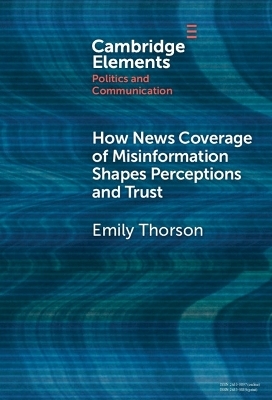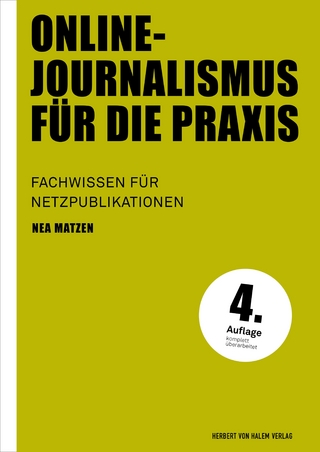
How News Coverage of Misinformation Shapes Perceptions and Trust
Seiten
2024
Cambridge University Press (Verlag)
978-1-009-48884-6 (ISBN)
Cambridge University Press (Verlag)
978-1-009-48884-6 (ISBN)
This Element shows that while exposure to news coverage of misinformation makes people less trusting of news on social media, it increases trust in print news. It suggests that many Americans see legacy media as bulwark against changes that threaten to distort the information environment.
This Element takes on two related questions: How do the media cover the issue of misinformation, and how does exposure to this coverage affect public perceptions, including trust? A content analysis shows that most media coverage explicitly blames social media for the problem, and two experiments find that while exposure to news coverage of misinformation makes people less trusting of news on social media, it increases trust in print news. This counterintuitive effect occurs because exposure to news about misinformation increases the perceived value of traditional journalistic norms. Finally, exposure to misinformation coverage has no measurable effect on political trust or internal efficacy, and political interest is a strong predictor of interest in news coverage of misinformation across partisan lines. These results suggest that many Americans see legacy media as a bulwark against changes that threaten to distort the information environment.
This Element takes on two related questions: How do the media cover the issue of misinformation, and how does exposure to this coverage affect public perceptions, including trust? A content analysis shows that most media coverage explicitly blames social media for the problem, and two experiments find that while exposure to news coverage of misinformation makes people less trusting of news on social media, it increases trust in print news. This counterintuitive effect occurs because exposure to news about misinformation increases the perceived value of traditional journalistic norms. Finally, exposure to misinformation coverage has no measurable effect on political trust or internal efficacy, and political interest is a strong predictor of interest in news coverage of misinformation across partisan lines. These results suggest that many Americans see legacy media as a bulwark against changes that threaten to distort the information environment.
1. Introduction; 2. Media attention to the misinformation phenomenon; 3. Potential effects of news coverage of misinformation; 4. Study 1: how misinformation coverage shapes perceptions and trust; 5. Study 2: misinformation coverage and media trust; 6. Study 3: why does misinformation coverage increase media trust?; 7. Conclusion; References.
| Erscheinungsdatum | 10.08.2024 |
|---|---|
| Reihe/Serie | Elements in Politics and Communication |
| Zusatzinfo | Worked examples or Exercises |
| Verlagsort | Cambridge |
| Sprache | englisch |
| Gewicht | 255 g |
| Themenwelt | Sozialwissenschaften ► Kommunikation / Medien ► Journalistik |
| Sozialwissenschaften ► Kommunikation / Medien ► Kommunikationswissenschaft | |
| Sozialwissenschaften ► Politik / Verwaltung | |
| ISBN-10 | 1-009-48884-8 / 1009488848 |
| ISBN-13 | 978-1-009-48884-6 / 9781009488846 |
| Zustand | Neuware |
| Informationen gemäß Produktsicherheitsverordnung (GPSR) | |
| Haben Sie eine Frage zum Produkt? |
Mehr entdecken
aus dem Bereich
aus dem Bereich
Fachwissen für Netzpublikationen
Buch | Softcover (2024)
Herbert von Halem Verlag
CHF 54,60


